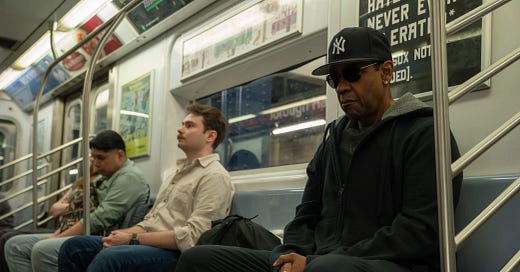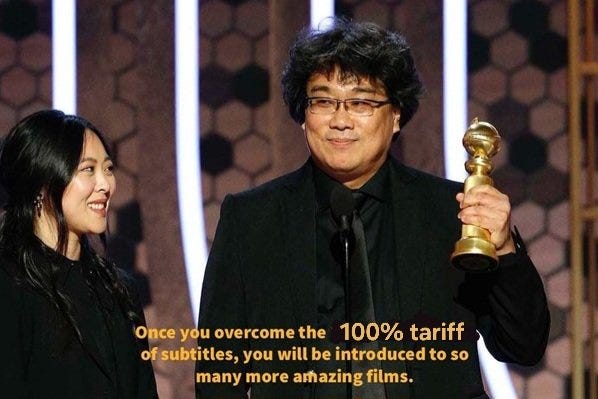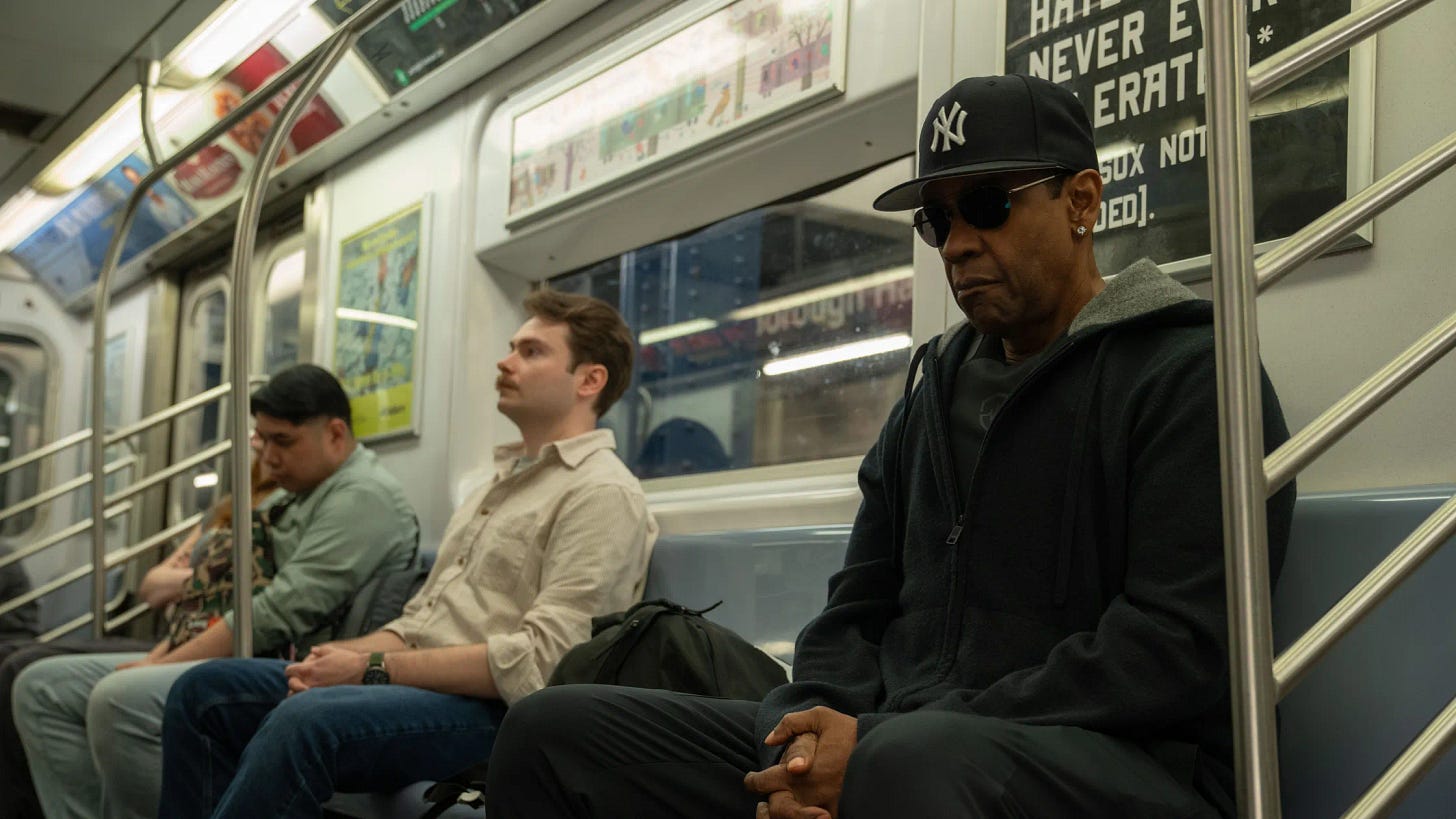Trump’s “America First” Tariffs Put Hollywood on Edge, Plus Spike Lee's New Joint 'Highest 2 Lowest'
What's worth your watch on streaming? Read on for my recommendations
Happy May, everybody! Today’s post was going to be a straightforward review, but—as he often does—President Donald Trump dropped yet another chaotic policy proposal, this time targeting the entertainment industry. The President announced that he’s been doing “a lot of research” and plans to place a 100% tariff on “any and all movies coming into our country that are produced in Foreign Lands. WE WANT MOVIES MADE IN AMERICA, AGAIN!”
What this means for foreign films screening in the U.S., and their future availability, is unclear. Currently, many American movies and TV shows are filmed abroad, thanks to generous film funding packages from countries like Canada. While cities like Atlanta and New York offer competitive incentives to keep productions local, it’s still often more affordable to shoot overseas due to lower labor costs. But Trump views this kind of foreign financial support as a national security threat.
Incidentally, I was chatting with a New York–based producer over the weekend who mentioned it’s been tough to land work lately—Canadian talent is just cheaper to hire.
“The Movie Industry in America is DYING a very fast death,” Trump wrote. “Other Countries are offering all sorts of incentives to draw our filmmakers and studios away from the United States. Hollywood, and many other areas within the U.S.A., are being devastated. This is a concerted effort by other Nations and, therefore, a National Security threat. It is, in addition to everything else, messaging and propaganda!”
I’ve previously written about the Trump tariffs and the fever dream of returning domestic manufacturing to American shores, along with his fixation on controlling American arts and culture. Most major Hollywood stakeholders are trying to figure out what this tariff policy even means and how it could possibly be implemented. Films are a service, how do you impose a tariff on an intangible asset?
Entertainment products like movies were exempt from Trump’s original “Liberation Day” tariffs because they are classified as services, rather than physical goods. The industry also took some assurance from the fact that film and series, much like big tech, represent one of the United States’ strongest trade surpluses, because of how much more Hollywood blockbusters bring in from abroad compared to foreign content’s slim earnings within the United States. — via The Hollywood Reporter
Perhaps some of the “research” the President has been doing involves looking into how countries like China operate—China is famously protective over how foreign films are even allowed to screen within its borders. There were also rumors that, in response to his Liberation Day tariffs, China was considering a ban on Hollywood movies altogether.
Chinese authorities hold a firm grip over every aspect of film distribution in the country and they have worked tirelessly over the years to boost local content at the expense of imported movies. Under former trade agreements, China committed to releasing 34 foreign films per year under revenue-share terms, with overseas studios permitted to a 25 percent share of ticket sales. Other films, usually smaller-budget titles, are imported via a buy-out system, where a local distributor pays a flat fee to release the movie in Chinese theaters. China’s film regulators also maintain strict censorship standards for film content and choose the release dates for all movies, reserving the most lucrative holiday windows for local Chinese films.
If these tariffs are levied, the American film industry is facing an extinction level event. One London-based producer quoted in Variety said, “If this goes the distance, it will decimate the industry. But you can’t just stop production,” he said. “When does it come into effect? What about movies in pre-production, that are shooting or in post? Would you just double their costs. None of this has been thought through. So I think the calm response is: Let’s see what this means, let’s see the fine print.”
Everything from low-budget indies to studio blockbusters are currently being made in countries like the U.K., France, Germany, and Hungary. Even Mel Gibson, who is one of the three Hollywood special ambassadors appointed by Trump (the other two are Sylvester Stallone and Jon Voight), is currently planning to shoot his “Passion of the Christ” sequel in Italy. — via Variety
Stateside movie production has dropped 40% over the past decade. The biggest threat to domestic film labor now is that, if these tariffs are actually implemented, studios may lean even harder into AI—and the U.S. could end up more culturally isolated than ever.
“Although no final decisions on foreign film tariffs have been made, the Administration is exploring all options to deliver on President Trump’s directive to safeguard our country’s national and economic security while Making Hollywood Great Again,” White House spokesman Kush Desai told The Hollywood Reporter.
This afternoon the President told reporters at the White House, “I’m not looking to hurt the industry; I want to help the industry. We’re going to meet with the industry. I want to make sure they’re happy with it, because we’re all about jobs.”
Highest 2 Lowest
Apparently the teaser trailer for Spike Lee’s new joint was supposed to drop tomorrow—but no one tells Spike what to do. He went ahead and posted it on his Instagram, beating distributors A24 and Apple TV to the punch. Honestly, I don’t blame him. A24 hasn’t exactly built a solid reputation for promoting Black-led films, and while Apple is improving, their marketing track record is still a work in progress.
Highest 2 Lowest is Spike’s take on High and Low (1963), the Akira Kurosawa police procedural starring Toshiro Mifune, which was itself a loose adaptation of the 1959 novel King’s Ransom by Evan Hunter. If you haven’t seen the original, I highly recommend watching it on Max. Spike’s reinterpretation centers on a music mogul (Denzel Washington), known for having the "best ears in the business," who becomes the target of a ransom plot and is thrust into a life-or-death moral dilemma. I’m excited to see his take on the subway ransom handoff scene, which was teased in the still below.
The Spike Lee x Denzel Washington combo never misses, and this teaser is giving all the New York vibes and classic Denzel-isms. I’m hyped. The film premieres out of competition at the 2025 Cannes Film Festival this month, hits theaters on August 22, and streams on Apple TV+ starting September 5.
Thunderbolts*
I haven’t seen this movie yet, but the marketing campaign pivoting to reveal a major spoiler just three days after its theatrical debut is something. The asterisk in the title was a subtle nod to the fact that this group of antiheroes were actually *The New Avengers. Frankly… they should’ve just called it The New Avengers from the jump—normie filmgoers don’t know what the Thunderbolts are or what that even means and the Avengers has way more name recognition. But maybe this phase of the campaign is meant to course-correct by revealing that twist and drawing casual fans, especially those who’ve lost interest in Marvel movies, back into theaters? I used to catch all of these films on the big screen, but I tapped out after Avengers: Endgame (2019). I also can’t be bothered to keep up with all the comic book lore spread across a dozen TV shows.
The movie’s doing pretty well at the domestic and international box office, and word of mouth seems solid. This video of Sebastian Stan walking up to a bus shelter to replace the old Thunderbolts* poster with one bearing the new title is kinda sad/funny. The pre-cut pieces of tape are just chef’s kiss, lol.
Tuning In: What’s Worth Your Time on Streaming
A Thousand Blows (2025) - Streaming on Hulu
A pair of Jamaican boxers, a thieving gang of ladies, and a criminal kingpin in 1880’s London's East End—I really enjoyed this series from the creator of Peaky Blinders. The lady gang is based on the real life Forty Elephants crime syndicate who raided high-end stores and posed as maids for wealthy families. I usually find portrayals of West Indian characters on TV to be hit or miss, but the two actors playing the Jamaican boxers absolutely nailed it—their accents were on point, and the subtle cultural mannerisms they brought to their performances were spot on. The show’s exploration of boxing history is also super interesting. I had no idea there was such a class divide between bare-knuckle boxing and gloved boxing, or how the sport evolved over time. The acting is fantastic throughout but the storytelling really hits its stride in the back half of the season, and you’ll definitely be left pining for season two—which, thankfully, was filmed back to back with the first.
The Order (2024) - Streaming on Hulu
I kind of wish I’d seen this one in theaters—it’s visually stunning in terms of cinematography and lighting, and the trailer doesn’t giveaway too many of the more striking scenes. It’s an oddly beautiful film about the rise of a real-life white supremacist terrorist organization known as The Order, which laid the groundwork for modern-day movements like the January 6 insurrectionists.
Jude Law is exceptional here. Even though the film gives limited backstory on his character, he conveys the exhaustion and trauma of a seasoned FBI agent in a way that feels authentic. I’m honestly surprised this film didn’t make more of a splash, especially given how timely and topical it is. Fans of True Detective season one will really dig this film.
Seeking Mavis Beacon (2024) - Streaming on Hulu
I saw this documentary a few weeks ago, and something about it just felt off—I couldn’t quite put my finger on it until I read an article about online surveillance recently. The first 30 to 40 minutes are super engaging: the storytelling is unique, and the filmmakers bring a visually fresh take to the genre. But the second half kind of goes off the rails as their original goal starts to unravel.
The doc follows a pair of amateur detectives on a mission to track down the elusive Mavis Beacon—Renée L'Espérance, a Haitian-born model who was essentially the face of one of the first AI agents. The twist? This real-life woman does not want to be found. She’s gone to great lengths to protect her privacy and remove herself from the internet, yet the two snoops at the center of the film won’t let up.
It’s definitely worth watching for what it says—or doesn’t say—about surveillance and consent. What does it mean to cross personal boundaries and make an entire film about someone who clearly doesn’t want to be located? Is that ethical? The director is so fixated on giving L'Espérance “her flowers” that she misses the message: this woman doesn’t want to be found, for reasons that are hers alone.
In the latter half, the director turns the camera on herself, and the storytelling shifts as she faces increasing roadblocks in her search. It becomes less about the subject and more about the filmmakers themselves. I think this doc ends up being an interesting time capsule—it was filmed during the post-lockdown phase of COVID—and reflects how these two young women were processing that moment. It’s almost like a piece of contemporary history, which in itself is pretty fascinating. Not many films have really captured that specific pandemic-era vibe, but this one does.
Companion (2025) and Babygirl (2025) are both now streaming on Max. Read my reviews at the links. Until next time!








That tariff on foreign movies is blowing my mind —- you can’t make this stuff up 🤦🏻♀️ Thanks for the recs! Def wanna check them out!